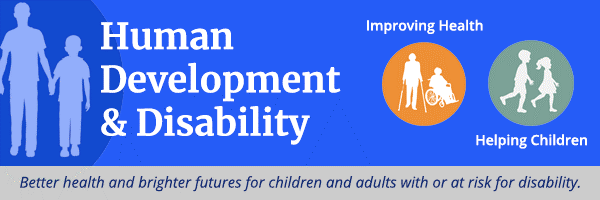DHDD Newsletter – August 2021

A Note from the DHDD Director:
Dear DHDD Partners,
I hope you are doing well and staying healthy. I know that many of you and the audiences you serve share my concerns about the COVID-19 Delta variant. This can add more worry to an already-stressful situation. Vaccination is the best way to protect people from hospitalization and death and also decreases spread (although it doesn’t eliminate it). This is important to protect our children under 12 who are not able to be vaccinated and people with reduced vaccine uptake due to being immunocompromised. As CDC learns more about this variant, it will be posted to our COVID-19 website. Please continue to check this site for important information.
On a more positive note, I am excited about a number of opportunities that have recently been awarded. A new five-year cycle has begun for the Disability and Health Promotion Branch’s state-based disability and health programs under Cooperative Agreement DD21-2103. This new cycle will build upon existing programs aimed at improving the health of Americans with intellectual and developmental disabilities and mobility limitations. Additionally, funding for two disability-focused national centers – Special Olympics and the National Center on Physical Activity and Disability – will also allow these organizations to continue to promote the health of people with disabilities. Child Development and Disability Branch funds also were recently awarded to continue to provide support for better understanding Fragile X syndrome (FXS) to improve the lives of children and adolescents with FXS, and their families. You can read more about all three of these in the newsletter below. Such great work and I am excited to see what these new funding cycles bring!
All the best,
Georgina
In the Spotlight
CDC Awards $4 Million Cooperative Agreement to Build on the Work of the FORWARD FXS Natural History Study

A $4 million cooperative agreement to “Characterize the Natural History of Fragile X Syndrome to Inform the Development of Intervention and Outcome Measures” was awarded to Dr. Elizabeth Berry-Kravis of Rush University Medical Center by CDC.
The five-year study funded by the grant will build on the foundation of the Fragile X Online Registry With Accessible Research Database (FORWARD) in collaboration with CDC’s Study to Explore Early Development (SEED) Follow-up Study. It will involve in-person standardized assessments to observe cognition, language, behavior, and autism diagnosis. The study will also explore the practical, financial, and psychological impact that caring for a family member with Fragile X syndrome (FXS) has on caregivers and siblings.
The project aims to better define the natural history of FXS and determine meaningful outcome measures that will improve the lives of children and adolescents with FXS, and their families.
United Hospital Fund Profiles Five Providers Offering Integrated Family Care
CDC funded a recent report by the United Hospital Fund, in collaboration with ChangeLab Solutions. The report describes how five service providers in New York, New Hampshire, and Michigan have implemented the emerging Integrated Family Care model, examining both their successes and challenges. Integrated Family Care aims to address the physical, behavioral, and social needs of families with young children who face significant adversity caused by social determinants of health. Providers that adopt elements of the model work to coordinate medical care, behavioral health care, and social services, with the goal of promoting long-term family and child well-being.
New Funds for Disability and Health State Programs
CDC has launched a new phase of funding for its Disability and Health State Programs. These programs work to improve the health and quality of life among people with disabilities through the adaptation and implementation of evidence-based strategies in their communities. Funding began August 1, 2021.

Over the next five years, CDC will invest more than $5 million to facilitate activities at nine existing sites and one new site (Georgia State University Foundation Inc.) within 10 states. The 10 sites include the following:
- Georgia State University Foundation Inc.
- Massachusetts Department of Public Health
- Michigan Department of Health and Human Services
- The Curators of the University of Missouri on behalf of UM-Kansas City
- Montana Department of Public Health and Human Services
- University System of New Hampshire
- Health Research Inc./New York State
- Ohio State University
- Oregon Health and Science University
- Utah Department of Health
This funding opportunity will facilitate
- Engagement with high-quality routine preventive healthcare,
- Adoption of healthy lifestyle behaviors, and
- Early identification, management, and control of chronic disease and mental health conditions among people with intellectual and developmental disabilities and people with mobility limitations.
Across the United States, an estimated 1 in 4 adults lives with a disability. This investment by CDC will support more inclusive state programs, communities, and health care to help people with, or at risk for, disabilities be well and active in their communities.
Please email dhddodrequests@cdc.gov with any questions.
COVID-19 Pandemic: Helping Young Children and Parents Transition Back to School – Spanish Feature Available

Many early care and education programs stayed open during the COVID-19 pandemic to provide needed care. But for many families, the pandemic meant keeping their children at home. Transitioning back to early childhood programs or school— or starting them for the first time—can be hard for children and families. Transition in a time of physical distancing, masks, and extra stress is extra hard. The feature describing what parents, teachers, and administrators can do to help children make a successful transition to in-person learning and care is now also available in Spanish.
Optimizing EHDI Surveillance Practices and Information Systems
The 39 jurisdictions funded under four-year Cooperative Agreement DD20-2006 (Improving Timely Documentation, Reporting, and Analysis of Diagnostic and Intervention Data through Optimization of EHDI Surveillance Practices and Information Systems) have successfully completed the first year of this latest project. During Year 1 all the funded judications successfully completed a range of activities that are helping to ensure all infants receive essential follow-up diagnostic and intervention services. This included advanced surveillance, data analytic, and evaluation activities.
New Resources
New EHDI Data Available
The Type and Severity data for infants identified with hearing loss in 2019 is now available online. For these latest 2019 data, updated tables and graphs with improved summaries have been included.
New Resources for Caregivers of People with IDD

Healthcare providers work hard to help their patients stay healthy and safe from COVID-19. When talking with patients who have intellectual and developmental disabilities (IDD), it’s especially important to make sure the message is simple and clear. These tips can help providers talk to patients with IDD about COVID-19.
New Resources for Providers with Patients who have IDD

A new guide for caregivers was recently developed to provide some tips based on what caregivers have found helpful in having important, and sometimes difficult, conversations about COVID-19.
Partners Release Inclusive Fitness Survey

Lakeshore Foundation and NCHPAD are interested in learning if people with disabilities feel welcomed in fitness spaces. Responses will be used to help tell the story nationally and spark innovative change and opportunity around inclusive fitness. The organizations have developed a short survey, which will take about 5 minutes to complete. The survey is open to U.S. residents, age 18 or older who have a disability or chronic condition.
Lakeshore Foundation and NCHPAD are asking partners to share the survey broadly amongst your constituents. Please share in your listservs, newsletters, social media platforms, and other print and electronic dissemination strategies to help reach the most people. The survey can be completed directly through Facebook or a survey link in English and Spanish.
Sample text to share:
Lakeshore Foundation and NCHPAD are interested in learning about if disabled people feel welcomed in fitness spaces. Your response and input will help us tell the story nationally and spark innovative change and opportunity for inclusive fitness.
Complete the survey on Facebook and share with a friend: https://survey.app.do/inclusivefitness
Complete the survey online in English or Spanish: https://bit.ly/2VJmsnq
Publications
New Report: Evaluation of the Feasibility and Perceived Value of Integrating Learn the Signs. Act Early. Developmental Monitoring Resources in Early Head Start
A new study published online in the Early Childhood Education Journal, presents findings from the evaluation of the use of Learn The Signs. Act Early. (LTSAE) resources in Early Head Start (EHS) programs in four states. The data indicate that EHS management, staff, and parents found the use of LTSAE resources valuable, feasible, and helpful in providing shared language to effectively discuss child development. These findings inform EHS and other early education programs that wish to enhance developmental monitoring, screening, and referral.

